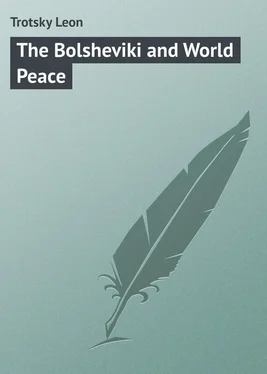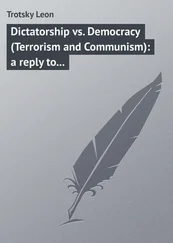Leon Trotsky - The Bolsheviki and World Peace
Здесь есть возможность читать онлайн «Leon Trotsky - The Bolsheviki and World Peace» — ознакомительный отрывок электронной книги совершенно бесплатно, а после прочтения отрывка купить полную версию. В некоторых случаях можно слушать аудио, скачать через торрент в формате fb2 и присутствует краткое содержание. ISBN: , Жанр: foreign_language, Русская классическая проза, на английском языке. Описание произведения, (предисловие) а так же отзывы посетителей доступны на портале библиотеки ЛибКат.
- Название:The Bolsheviki and World Peace
- Автор:
- Жанр:
- Год:неизвестен
- ISBN:http://www.gutenberg.org/ebooks/40273
- Рейтинг книги:4 / 5. Голосов: 1
-
Избранное:Добавить в избранное
- Отзывы:
-
Ваша оценка:
- 80
- 1
- 2
- 3
- 4
- 5
The Bolsheviki and World Peace: краткое содержание, описание и аннотация
Предлагаем к чтению аннотацию, описание, краткое содержание или предисловие (зависит от того, что написал сам автор книги «The Bolsheviki and World Peace»). Если вы не нашли необходимую информацию о книге — напишите в комментариях, мы постараемся отыскать её.
The Bolsheviki and World Peace — читать онлайн ознакомительный отрывок
Ниже представлен текст книги, разбитый по страницам. Система сохранения места последней прочитанной страницы, позволяет с удобством читать онлайн бесплатно книгу «The Bolsheviki and World Peace», без необходимости каждый раз заново искать на чём Вы остановились. Поставьте закладку, и сможете в любой момент перейти на страницу, на которой закончили чтение.
Интервал:
Закладка:
On July 3, 1914, after the assassination at Sarajevo, the Vorwärts wrote:
"The bourgeois revolution of the South Slavs is in full swing, and the shooting at Sarajevo, however wild and senseless an act in itself, is as much a chapter of this revolution as the battles by which the Bulgarians, Serbs and Montenegrins liberated the peasants of Macedonia from the yoke of Turkish feudal exploitation. Is it a wonder that the South Slavs of Austria-Hungary look with longing to their racial brothers in the kingdom of Servia? The Serbs in Servia have attained the highest goal a people can attain in the present order of society. They have attained national independence. Whereas in Vienna or Budapest they treat every one bearing the name of Serb or Croatian with blows and kicks, with court-martial justice and the gallows… There are seven and a half million South Slavs who, as a result of the victories in the Balkans, have grown bolder than ever in demanding their political rights. And if the imperial throne of Austria continues to resist their impact, it will topple over and the entire Empire with which we have coupled our destiny will break to pieces. For it is in line with historic evolution that such national revolutions should march onward to victory."
If the international Social Democracy together with its Servian contingent, offered unyielding resistance to Servia's national claims, it was certainly not out of any consideration for the historic rights of Austria-Hungary to oppress and disintegrate the nationalities living within her borders; and most certainly not out of consideration for the liberating mission of the Hapsburgs. Until August, 1914, no one, except the black and yellow hirelings of the press, dared to breathe a word about that. The Socialists were influenced in their course of conduct by entirely different motives. First of all, the proletariat, although by no means disputing the historic right of Servia to strive for national unity, could not trust the solution of this problem to the powers then controlling the destinies of the Servian kingdom. And in the second place-and this was for us the deciding factor-the international Social Democracy could not sacrifice the peace of Europe to the national cause of the Serbs, recognizing, as it did, that, except for a European revolution, the only way such unity could be achieved was through a European war.
But from the moment Austria-Hungary carried the question of her own fate and that of Servia to the battlefield, Socialists could no longer have the slightest doubt that social and national progress would be hit much harder in Southeastern Europe by a Hapsburg victory than by a Servian victory. To be sure, there was still no reason for us Socialists to identify our cause with the aims of the Servian army. This was the idea that animated the Servian Socialists, Ljaptchevitch and Katzlerovitch, when they took the manly stand of voting against the war credits. 2 2 To appreciate fully this action of the Servian Socialists we must bear in mind the political situation by which they were confronted. A group of Servian conspirators had murdered a member of the Hapsburg family, the mainstay of Austro-Hungarian clericalism, militarism, and imperialism. Using this as a welcome pretext, the military party in Vienna sent an ultimatum to Servia, which, for sheer audacity, has scarcely ever been paralleled in diplomatic history. In reply, the Servian government made extraordinary concessions, and suggested that the solution of the question in dispute be turned over to the Hague tribunal. Thereupon Austria declared war on Servia. If the idea of a "war of defense" has any meaning at all, it certainly applied to Servia in this instance. Nevertheless, our friends, Ljaptchevitch and Katzlerovitch, unshaken in their conviction of the course of action that they as Socialists must pursue, refused the government a vote of confidence. The writer was in Servia at the beginning of the War. In the Skuptchina, in an atmosphere of indescribable national enthusiasm, a vote was taken on the war credits. The voting was by roll-call. Two hundred members had all answered "Yes." Then in a moment of deathlike silence came the voice of the Socialist Ljaptchevitch-"No." Every one felt the moral force of this protest, and the scene has remained indelibly impressed upon my memory.
But surely we had still less reason to support the purely dynastic rights of the Hapsburgs and the imperialistic interests of the feudal-capitalistic cliques against the national struggle of the Serbs. At all events, the Austro-Hungarian Social Democracy, which now invokes its blessings upon the sword of the Hapsburgs for the liberation of the Poles, the Ukrainians, the Finns and the Russian people, must first of all clarify its ideas on the Servian question, which it has gotten so hopelessly muddled.
The question at issue, however, is not confined to the fate of the ten million Serbs. The clash of the European nations has brought up the entire Balkan question anew. The Peace of Bucharest, signed in 1903, has solved neither the national nor the international problems in the Near East. It has only intensified the added confusion resulting from the two unfinished Balkan Wars, unfinished because of the complete temporary exhaustion of the nations participating in it.
Roumania had followed in the path of Austro-Hungarian politics, despite the Romanesque sympathies of its population, especially in the cities. This was due not so much to dynastic causes, to the fact that a Hohenzollern prince occupied the throne, as to the imminent danger of a Russian invasion. In 1879 the Russian Czar, as thanks for Roumania's support in the Russo-Turkish war of "liberation," cut off a slice of Roumanian territory, the province of Bessarabia. This eloquent deed provided a sufficient backing to the dynastic sympathies of the Hohenzollern in Bucharest. But the Magyar-Hapsburg clique succeeded in incensing the Roumanian people against them by their denationalizing policy in Transylvania, which has a population of three million Roumanians as against three-fourths of a million in the Russian province of Bessarabia; and they further antagonized them by their commercial treaties, which were dictated by the interests of the large Austro-Hungarian land-owners. So that Roumania's entrance into the War on the side of the Czar, despite the courageous and active agitation against participation in the War on either side, carried on by the Socialist party under the leadership of my friends Gherea and Rakowsky, is to be laid altogether at the door of the ruling class of Austria-Hungary, who are reaping the harvest they have sown here as well as elsewhere.
But the matter is not disposed of by fixing the historical responsibility. To-morrow, in a month, in a year or more the War will bring to the foreground the whole question of the destiny of the Balkan peoples and of Austria-Hungary, and the proletariat will have to have its answer to this question. European democracy in the nineteenth century looked with distrust at the Balkan people's struggle for independence, because it feared that Russia might be strengthened at the expense of Turkey. On this subject Karl Marx wrote in 1853, on the eve of the Crimean War:
"It may be said that the more firmly established Servia and the Servian nationality is the more the direct influence of Russia on the Turkish Slavs is shoved into the background. For in order to be able to assert its peculiar position as a state, Servia had to import its political institutions, its schools … from Western Europe."
This prophecy has been brilliantly fulfilled in what has actually happened in Bulgaria, which was created by Russia as an outpost on the Balkans. As soon as Bulgaria was fairly well established as a national state, it developed a strong anti-Russian party, under the leadership of Russia's former pupil, Stambulov, and this party was able to stamp its iron seal upon the entire foreign policy of the young country. The whole mechanism of the political parties in Bulgaria is so constructed as to enable it to steer between the two European combinations without being absolutely forced into the channel of either, unless it chooses to enter it of its own accord. Roumania went with the Austro-German alliance, Servia, since 1903, with Russia, because the one was menaced directly by Russia, the other by Austria. The more independent the countries of Southeast Europe are from Austria-Hungary, the more effectively they will be able to protect their independence against Czarism.
Читать дальшеИнтервал:
Закладка:
Похожие книги на «The Bolsheviki and World Peace»
Представляем Вашему вниманию похожие книги на «The Bolsheviki and World Peace» списком для выбора. Мы отобрали схожую по названию и смыслу литературу в надежде предоставить читателям больше вариантов отыскать новые, интересные, ещё непрочитанные произведения.
Обсуждение, отзывы о книге «The Bolsheviki and World Peace» и просто собственные мнения читателей. Оставьте ваши комментарии, напишите, что Вы думаете о произведении, его смысле или главных героях. Укажите что конкретно понравилось, а что нет, и почему Вы так считаете.











